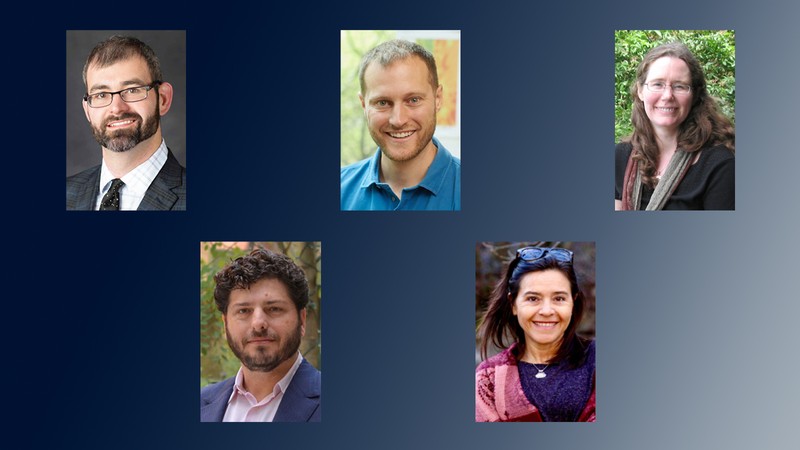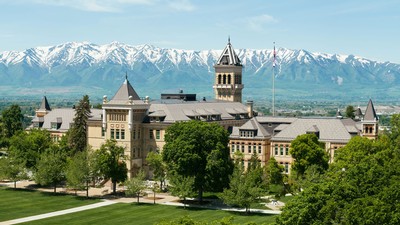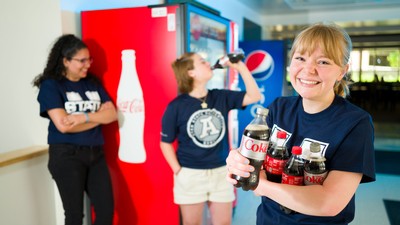Five USU Faculty Receive Fulbright Awards
By Marcus Jensen |
LOGAN, Utah — Four Utah State University faculty members have received the prestigious Fulbright U.S. Scholar Program award for the 2024-25 academic year from the U.S. Department of State and the Fulbright Foreign Scholarship Board.
The four professors will teach or conduct research abroad, building their skills and connections, gain valuable international insights, and return home to share their experiences with their students and colleagues. The world’s largest and most diverse international educational exchange program, the Fulbright Program is dedicated to increasing mutual understanding between scholars in the U.S. and other countries.
Additionally, another USU faculty member will participate in the Fulbright Specialist Program. The program pairs highly qualified U.S. academics and professionals with host institutions abroad to share their expertise, strengthen institutional linkages, hone their skills, gain international experience and learn about other cultures while building capacity at their overseas host institutions. The program aims to provide a short-term, on-demand resource to international host institutions, giving them greater flexibility in how they participate with Fulbright.
USU’s 2024 Fulbright Scholars are:
- Ryan Berke, travelling to the United Kingdom.
- Brent Chamberlain, travelling to Portugal.
- David Feldon, travelling to Australia.
- Kimberly Hageman, travelling to Italy.
USU’s 2024 Fulbright Specialist is Maria Luisa Spicer-Escalante, travelling to Brazil.
Ryan Berke
Ryan Berke, associate professor of Mechanical and Aerospace Engineering in the College of Engineering, will travel to the United Kingdom. He will be stationed at the University of Sheffield in England, where he will be testing methods used for the Air Force using metals and implementing them in the U.K. for composites materials.
“The research objective of my work is to use vibration-based measurements to more quickly characterize fatigue in fiber-reinforced composites,” Berke said. “In parallel, I will strengthen international ties to promote world-class research collaborations and the international exchange of students.”
Berke began teaching at USU in 2015 after receiving his Ph.D. from The Ohio State University and working as a postdoctoral researcher at the University of Illinois, Urbana-Champaign. He has received numerous awards, including a Young Investigator grant from the Air Force Office of Scientific Research, and he was the Outstanding Undergraduate Research Mentor of the Year in 2019 and in 2024. More than half of his graduating students have gone on to earn advanced degrees.
His lab uses advanced imaging techniques to extract full-field, in situ deformation and strain measurements across temperature, time and length scales. His work has been sponsored by the US Department of Energy, the Nuclear Regulatory Commission, the National Science Foundation, the Air Force Research Lab and NASA, among others.
Brent Chamberlain
Brent Chamberlain, associate professor of Landscape Architecture & Environmental Planning in the College of Agriculture and Applied Sciences, will travel to Portugal, spending four months at the University of Lisbon beginning in February 2025. While in Portugal, Chamberlain will also collaborate with University Institute of Lisbon.
Chamberlain began teaching at USU in 2018 as an assistant professor after five years at Kansas State University. He holds a doctorate degree in forestry from the University of British Columbia, where he was also a postdoctoral fellow. He has received numerous awards, most recently being named the CAAS Researcher of the Year for 2023-24. He has also made recent headlines for his work with the Utah Department of Transportation on research of vertiports.
Chamberlain’s work encompasses using visualization tools and spatial analysis related to human behavior in environmental planning decisions, assessing human effects in the built environment with applied computational approaches and investigating environmental perception (spatial memory) of built and natural environments.
Chamberlain will be accompanied by his family on this sabbatical. His children go to an elementary school where they are in a Portuguese immersion program, and the children are excited to practice their Portuguese.
David Feldon
David Feldon, professor of Instructional Technology and Learning Sciences in the College of Education and Human Services, will travel to Australia in early February 2025 as part of the international educational exchange program. Feldon aims to better understand how participation in an oral dissertation defense impacts students and how they might best prepare for it. Because the oral defense is relatively new in Australia, Feldon will delve deep into Australia’s academic cultural nuances for the three months he will spend at the University of Newcastle.
“In the United States, we have a long-standing tradition of an oral dissertation defense,” Feldon said. “We have a highly developed cultural model of what it means to defend a dissertation and we are prepared early on how to do the oral defense. Not because we necessarily get a class on it and then practice it, but because everybody knows that, when we’re talking about a dissertation, a big part of it is the oral defense.”
He added: “Australia’s method is unusual. Over the last 10 years they’ve gone from oral defenses never happening to about 50 percent of doctoral students doing an oral defense. Researching to Australia — where that context is changing — will allow me to understand how scholars are preparing for their oral dissertation, how they are developing skills, and how well they do based on different experiences they’ve had. There isn’t a homogenous experience of what it means to do this in Australia.”
Feldon is primarily interested in examining the cultural aspects of preparing for the defense.
“I seek to understand how skills develop in a way that is separate from unspoken cultural expectations,” Feldon said. “And when I say cultural, I don’t necessarily mean ethnicity or religion. Every discipline, including academia, has its own culture. For instance, when we say ‘making an argument,’ what does that mean? When we say, ‘You’ve proved your point,’ what does that mean? When we say, ‘You’ve done a good enough job to get a Ph.D.,’ what does that mean?”
When applying for the Fulbright award, Feldon actively sought out Australia and particularly the University of Newcastle as his destination of choice.
“I have colleagues who work in doctoral education at the University of Newcastle,” Feldon said. “This is the scope of research I’m interested in, and it is only happening there. I have existing relationships with scholars who are looking at it right now, but they are looking at it from an Australian perspective, not an American perspective. I want to go over and work with them.”
In addition to researching with and learning from his colleagues at Newcastle, Feldon will work extensively with a diverse group of students: aboriginal, international, as well as Australians of European descent.
“I expect to see some differences in the diversity in the same way we [at USU] have students who come from the Navajo nation or the Ute tribe,” he said. “The norms of discourse and interactions are a little different than they are for people of European descent.”
Kimberly Hageman
Kimberly Hageman, professor of Environmental and Analytical Chemistry in the College of Science, will travel to Como, Italy, to the University of Insubria. This award affords the environmental chemist an opportunity to work in-person with an Italian peer whose research interests overlap with her own. She will travel in September 2024 to foster collaboration between her research group and professor Antonio Di Guardo in Insubria’s Department of Science and High Technology.
“For years, both of us have studied the accumulation of contaminants in vegetation, and the molecular processes that govern contaminant-plant interactions,” Hageman said. “We also share a common interest in the effects of synthetic plastic particles on environmental processes, an area of increasing urgency for the global community.”
Como, located in northern Italy’s Lombardy region, sits at the southern tip of scenic Lake Como and is rimmed by the Alps.
“I’m excited about the destination and the project’s potential,” Hageman said. “In addition to advancing understanding of contaminant-particle-vegetation interactions, we plan student exchanges, virtual cross-cultural discussions and a Mini Student Research Symposium, as we mentor students in research and in developing collaborations across borders.”
Maria Luisa Spicer-Escalante
Maria Luisa Spicer-Escalante, a professor in the Department of World Languages and Cultures, is a recipient of a Fulbright Specialist Program Award for 2024-2027. This award will see Spicer-Escalante complete a project in Brazil at the Universidade Catolica de Brasilia, where she will share her expertise in teaching preparation.
As a Fulbright Specialist, Spicer-Escalante will deliver a series of workshops at the Universidade Catolica. Her presentation will focus on self and collaborative teaching assessments and will be offered to numerous instructors teaching at the elementary, secondary and university levels. She will also be working with graduate students at the Programa de Mestrado de Doutorado em Educação.
“This appointment … is a notable recognition of both my teaching and research endeavors in the field of teacher preparation, an area to which I have dedicated my academic and professional career as an applied linguist,” Spicer Escalante said.
This dedication to her craft is evident in the fact that this is the fifth time Spicer-Escalante has been selected by the Fulbright Program. She was first a recipient in 2012, then again in 2016, 2017 and 2023. Of the various awards Professor Spicer-Escalante has received, the Fulbright Specialist Award marks the first time she has been given to opportunity to participate in a multi-year program.
“For a period of three years, I will be part of a pool of scholars who can either apply to be part of an open project around the world where … specialization is required, or [specialists] can be selected by a particular institution that has applied for … a specific area of expertise,” Spicer-Escalante said.
Her participation will help USU students as well as those abroad.
“This appointment at the Universidade Catolica de Brasilia will provide me with the occasion not only to broaden my knowledge and understanding of other people and other cultures but also to continue learning and strengthening my research and teaching efforts,” Spicer-Escalante said. “I will bring my enhanced understanding back to my home institution, where it will lend new dimensions to the way I train language teachers … [and] will benefit future students at USU, with whom I will be able to share more examples and ideas from a culture very different from their own.”
About the Fulbright Scholar Award
Since 1946, the Fulbright Program has provided over 400,000 talented and accomplished students, scholars, teachers, artists and professionals of all backgrounds with the opportunity to study, teach and conduct research abroad. Fulbrighters exchange ideas, build people-to-people connections and work to address complex global challenges. Notable Fulbrighters include 62 Nobel Laureates, 89 Pulitzer Prize winners, 80 MacArthur Fellows, 41 heads of state or government, and thousands of leaders across the private, public and nonprofit sectors.
Over 800 individuals teach or conduct research abroad through the Fulbright U.S. Scholar Program annually. In addition, over 2,000 Fulbright U.S. Student Program participants — recent college graduates, graduate students and early career professionals — participate in study/research exchanges or as English teaching assistants in local schools abroad each year.
Fulbright is a program of the U.S. Department of State, with funding provided by the U.S. Government. Participating governments and host institutions, corporations and foundations around the world also provide direct and indirect support to the rogram, which operates in over 160 countries worldwide.
In the United States, the Institute of International Education implements the Fulbright U.S. Student and U.S. Scholar Programs on behalf of the U.S. Department of State. For more information about the Fulbright Program, visit https://fulbrightprogram.org.
USU communicators Mary-Ann Muffoletto, Lynnette Harris, Sydney Dahle, Alicia Richmond and Andrea DeHaan contributed to this story.
WRITER
Marcus Jensen
News Coordinator
University Marketing and Communications
marcus.jensen@usu.edu
CONTACT
John Rice
Associate Professor
Department of Civil and Environmental Engineering
435-797-8611
john.rice@usu.edu
TOPICS
Awards 711stories Faculty 321stories International 63storiesComments and questions regarding this article may be directed to the contact person listed on this page.







